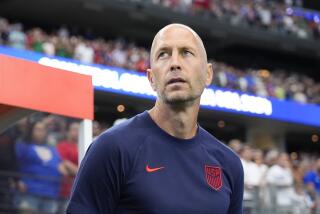World Cup ’94 : WORLD CUP USA ’94 / GROUP D PREVIEW : Turmoil’s Team : Argentina Has Knack for Turning Bad Fortune and Bad Feelings Into Good Results
- Share via
Something will happen. Some collapse or crisis or catastrophe will present itself and the national soccer team of Argentina will be delirious with joy. Infighting, attacks from without, injuries and feuds: At last, the proper ambience in which to conduct a World Cup campaign.
That’s not to discount the importance of the disasters that already have befallen Argentina, as seen from the Argentines’ point of view: the ill-advised selection of an inappropriate coach, the unfairly harsh multiple-month suspensions of their two best players for cocaine use, and cruel opponents with dirty tactics during World Cup qualifying.
Those were the helpful items.
Now come the daily, almost hourly updates of outrage from the team’s fading and portly star, whose threats to quit the team are as frequent as his trips to the snack bar.
What to expect of Argentina, a team historically possessed of players of singular brilliance and verve and often equally bad manners? Expect the team to concoct something, some obstacle that will elevate its mental sharpness to the level of its physical skill.
This was the team that has found a kind of perverse buoyancy in moments of deepest despair. Witness the team’s rebound in the 1990 World Cup after losing its starting goalkeeper to a broken leg 12 minutes into the second game. The backup, Sergio Goycochea, emerged as the King of the Shootout because of his uncanny knack for saving penalty kicks.
Nothing needed to be manufactured to motivate the Argentine team or fans during the prolonged World Cup qualifying. Argentina lurched through its South American qualifying group with the sort of hubris that describes much of the team’s approach to opponents, no matter how impressive.
Argentina expects to win, usually without much effort but with a great show of style. Mowing down the teams in its group and qualifying for the World Cup finals was such a given that few Argentines discussed much more than to which city their team might be assigned in the draw.
Thus, the team’s skin-of-the-teeth qualification campaign came, at first, as a shock to Argentina’s fans. A familiar wave of fickleness overcame them, and throughout Argentina fans began to allow as how anyone could have seen this coming with Coach Alfio Basile and that broken-down wreck of a team.
Lost among the wreckage was that Argentina went into qualifying with a 33-game international winning streak, having won back-to-back South American championships. All was forgotten when Colombia beat Argentina, 2-1, in Barranquilla. Worse, Argentina played to a scoreless draw against Paraguay two games later, then finished with a 5-0 loss to Colombia in Buenos Aires.
Argentina had the back-against-the-wall environment in which it thrives, so it should be no surprise that everything worked. First, Paraguay could manage only a tie with Peru on the same day that Argentina was being trounced by Colombia. That left Argentina tied for second with Paraguay in its qualifying group, but with the advantage in tiebreakers.
That sent Argentina into a home-and-home playoff with a representative from the Oceania group, Australia, for the last place in the tournament.
Basile knew the direness of the situation and he acted accordingly. He called up Diego Maradona. The 33-year-old legend had been in recent years reduced to a role of team mascot, but Basile knew the boost Maradona would provide.
The coach knew best and Maradona--thanks to a crash diet and yet another stab at serious training--did make a difference. The start wasn’t encouraging: The teams played to a 1-1 draw in Sydney.
On Nov. 17, 1993, the final game of the two years of World Cup qualifying was played.
Argentina had one more advantage--playing at home, in massive River Plate Stadium in Buenos Aires. Argentina outplayed Australia, but neither team could score. Another tie was too disastrous to contemplate. But disaster chose Australia. One of its defenders inadvertently knocked the ball into his own net, and Argentina won in a most unlikely manner: 1-0, on an own goal.
Argentina made it, slinking in through the World Cup’s back door.
In the relief of the victory, fans adopted an I-knew-it-all-along attitude, but Basile and the team remembered every slight.
“Argentina will be among the top four (in the World Cup), and that will shut our critics’ mouths,” Basile said. “In this country, talk is cheap.”
So Argentina is in, drawn into Group D with Nigeria, Bulgaria and Greece with its base in Boston. The Argentines should have little trouble advancing from their group, except for an expected strong performance from Nigeria. In fact, despite its record in qualifying, Argentina is considered among the tournament’s favorites.
That might be because of Argentina’s special relationship with the World Cup. Looking at the country’s international record, some would conclude the team was merely respectable. But Argentine players know when to be tourists and when to pay attention. Their World Cup record proves it--champions in 1978 and 1986 and runners-up in 1930 and 1990.
Argentina’s play in the 1990 tournament in Italy did its reputation little good. Soccer experts are fond of referring to certain styles of play as “cynical,” by which they mean that teams abandon conventional tactics in favor of ruthless tackling and defensive protectionism.
The championship game against West Germany was universally panned. Paul Gardner, in his book “The Simplest Game,” called it a “truly awful, totally forgettable final.”
Four Argentine players were suspended for the final, including potent forward Claudio Caniggia. Maradona was barely fit because of a severely swollen ankle. Carlos Monzon became the first player in Cup history to be ejected from the final, and Argentina played on with only 10 men. Another was lost to ejection soon after.
When Germany scored on a penalty kick five minutes from the end, Argentina became the only team to fail to score in a final.
The shards of that team remain. Maradona is back and his meaning to the team cannot be underestimated. The soap opera that is Maradona has had him threatening to quit the team on many occasions, most recently when the mother of another player charged that Maradona had too much influence on roster decisions.
Caniggia, a quick and dangerous forward, has just come off a 13-month suspension for cocaine use and appears to be back in form. Lest his return be trumpeted too loudly, however, Caniggia launched this preemptive strike: “Don’t start billing me as a savior.”
There are other question marks. Veteran defender Oscar Ruggeri, who has played on two World Cup teams, might have seen better days. Forward Gabriel Batistuta might have lost something when his Italian team, Fiorentina, was demoted to the second division.
Goycochea, yesterday’s hero, has lost his starting job with his Argentine club, River Plate. The midfield, long Argentina’s strength, has had trouble communicating. Fernando Redondo and Diego Simeone have sent mixed signals, as have the forwards, Abel Balbo and Caniggia.
They are all privately critical of the coach.
In short, everything is perfect for Argentina. It should do well.
More to Read
Go beyond the scoreboard
Get the latest on L.A.'s teams in the daily Sports Report newsletter.
You may occasionally receive promotional content from the Los Angeles Times.








